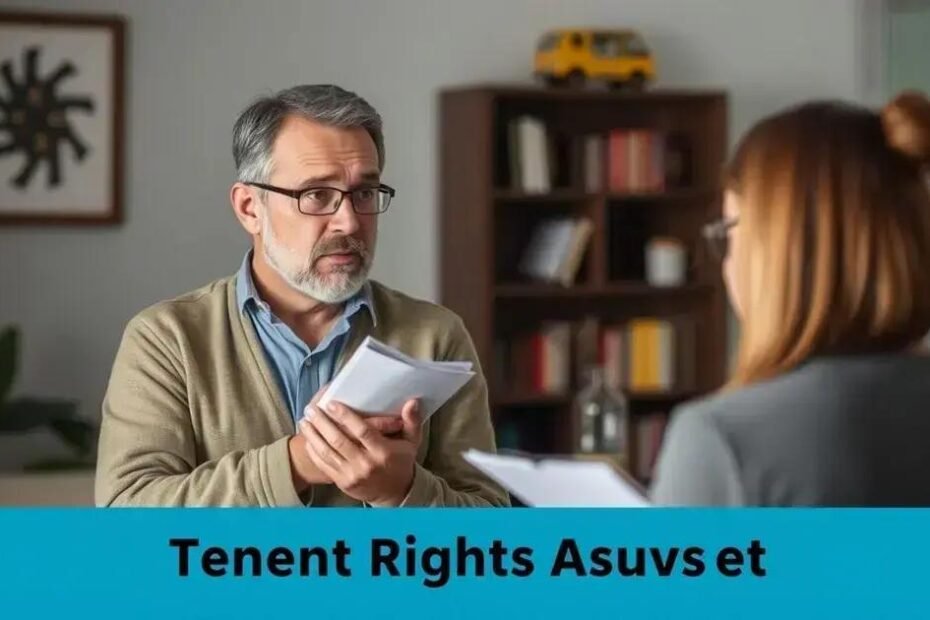Tenant eviction safeguards are legal protections that ensure tenants can fight wrongful evictions, requiring landlords to follow due process while allowing for communication and resolution of issues before facing eviction.
Tenant eviction safeguards play a crucial role in ensuring that renters know their rights and can protect themselves in challenging situations. Have you ever wondered how these protections really work and what steps you can take? Let’s dive in.
Understanding tenant eviction safeguards
Understanding tenant eviction safeguards is essential for anyone renting a home. These safeguards can significantly influence how disputes and potential evictions are managed.
In many situations, tenants may feel overwhelmed or uncertain about their rights. Knowing what protections are in place can help to alleviate some of that stress.
Key Elements of Tenant Eviction Safeguards
There are several crucial components to consider when discussing tenant eviction safeguards. These elements provide a framework that helps both tenants and landlords navigate the complex process of eviction.
- Notice Requirements: Landlords often must provide a written notice to the tenant before proceeding with eviction.
- Reason for Eviction: Legal grounds for eviction may vary, but they usually need to be legitimate and documented.
- Right to Contest: Tenants have the right to contest the eviction in court and present their case.
- Time Allowance: Many jurisdictions require that tenants be given a certain timeframe to address any issues.
These provisions serve to ensure tenants are not removed from their homes without proper due process. This emphasizes the significance of communication between landlords and renters. When misunderstandings arise, clear dialogue can often lead to resolutions without the need for legal action.
The Importance of Legal Representation
When facing eviction, having access to legal resources can make a significant difference. Many tenants may not fully understand their rights. Legal professionals can offer advice on how to navigate the system, ensuring that tenants are aware of their options.
Additionally, organizations exist to support tenants during these challenging times. They provide legal assistance, advocacy, and valuable information to overcome hurdles related to housing security.
In summary, understanding tenant eviction safeguards is crucial for both tenants and landlords. Familiarizing yourself with these protections ensures that individuals are better prepared to handle eviction situations. Being informed can empower tenants to take necessary actions when faced with potential eviction.
Common reasons for eviction
Common reasons for eviction can vary, but they usually fall into a few specific categories. Understanding these reasons can help tenants avoid eviction and maintain stable housing.
Many tenants may not realize that issues leading to eviction can sometimes be resolved before they escalate. Being proactive is key to ensuring that disputes do not lead to legal actions.
Frequent Causes of Eviction
Some reasons for eviction are more common than others. Knowing these causes can help tenants understand what to avoid in order to keep their housing secure.
- Non-Payment of Rent: This is one of the most common reasons. When rent is not paid on time, landlords may begin the eviction process.
- Lease Violations: Violating the terms of the lease, such as having unauthorized pets or guests, can result in eviction.
- Property Damage: Significant damage to the rental property can lead landlords to take action against tenants.
- Illegal Activities: Engaging in illegal activities on the premises, such as drug use or trafficking, is a serious cause for eviction.
Besides the reasons noted above, there are other factors that can affect a tenant’s situation. For instance, disturbances to neighbors or failure to maintain a clean living space can prompt landlords to consider eviction.
It’s important for tenants to communicate with their landlords about any issues that might arise. Clear communication can sometimes prevent misunderstandings and help find solutions before they escalate into eviction notices.
Mitigating Eviction Risks
To mitigate the risk of eviction, tenants can take proactive steps. Staying informed about lease terms and maintaining open channels of communication with landlords can be very helpful. Moreover, addressing any issues promptly can help stabilize situations that might otherwise lead to eviction.
Landlords also play a significant role in the eviction process. Understanding their responsibilities can lead to better relationships with tenants. By fostering a supportive environment, landlords can often minimize disputes and encourage timely rent payments.
Legal rights of tenants during eviction

The legal rights of tenants during eviction are essential to understand. When facing eviction, tenants should be aware of their protections under the law.
These rights vary by state and locality, but some common principles apply nationwide. Knowing what rights you have can empower you to respond effectively to eviction notices.
Common Legal Rights of Tenants
Tenants typically possess several key legal rights that help protect them during the eviction process. Here are some of the principal rights:
- Right to Notice: Most states require landlords to provide tenants with written notice of eviction, stating the reasons why.
- Right to Contest the Eviction: Tenants have the right to appear in court and challenge the eviction if they believe it is unjust.
- Right to Fair Treatment: Evictions must follow legal procedures. Landlords cannot use illegal tactics, such as locking tenants out without proper process.
- Right to a Hearing: Tenants are entitled to a hearing where they can present their case to a judge.
Understanding these rights is crucial for tenants facing eviction. Many people do not realize that they can challenge an eviction or seek help from local tenant advocacy groups.
Seeking Assistance
When confronted with eviction, tenants should reach out for assistance. Local legal aid offices can provide valuable information on how to navigate the eviction process.
It is also wise to keep all records related to tenancy. This includes leases, rent payment receipts, and any correspondence with landlords. Documentation can be critical during legal proceedings.
Moreover, knowing your rights helps foster better communication with landlords. If issues arise, discussing the problems can often lead to a resolution without escalating to eviction.
Steps to take when facing eviction
Facing eviction can be a daunting experience, but knowing the steps to take can help tenants manage the situation more effectively. Understanding what to do can make a significant difference in the outcome.
One of the first things to do when you receive an eviction notice is to read it carefully. This notice will contain important information, including the reason for eviction and the deadlines that apply.
Immediate Actions to Consider
After receiving an eviction notice, tenants should consider taking the following actions:
- Assess the Notice: Understand the specifics of the notice. Know your rights as a tenant and the reasons stated for the eviction.
- Communicate with Your Landlord: Open a line of communication with your landlord. Discuss the situation and see if there are solutions that could prevent eviction.
- Gather Documentation: Collect any documents that can support your case, including rental agreements, payment receipts, and any correspondence related to the issues.
- Seek Legal Advice: It’s wise to contact a lawyer or a local legal aid organization for advice. They can provide guidance on how to proceed based on your specific circumstances.
Don’t wait until the last minute; act as soon as you receive the notice. This can allow time for negotiation or finding alternative solutions.
Consider Other Options
If eviction seems unavoidable, look into other options. Consider if moving to a new rental might be feasible. Research available resources for tenants in crisis, such as relocation assistance and affordable housing programs.
In some cases, tenants may qualify for emergency rental assistance or social services that can help them stay afloat financially. Contact local community organizations for support options.
Always remember that you have rights as a tenant. Taking proactive steps and knowing the proper actions can help manage a difficult situation during an eviction process.
Preventing eviction through communication
Preventing eviction through communication is one of the most effective strategies tenants can use. Open dialogue with landlords can often resolve issues before they escalate.
Many disputes arise simply because of misunderstandings or a lack of information. When tenants reach out and communicate openly, they can share their concerns and work together with landlords towards a solution.
Key Communication Strategies
Here are some strategies that can help you communicate effectively with your landlord:
- Be Proactive: Don’t wait until problems arise. Regular updates about your rental situation can foster a good relationship.
- Address Issues Early: If you’re having trouble making rent or facing other issues, contact your landlord as soon as possible. Letting them know can help prevent misunderstandings.
- Document Conversations: Keep a record of all communication with your landlord. This can include emails, text messages, and notes from phone calls.
- Seek to Understand: Listen carefully to your landlord’s concerns and try to find common ground. Showing empathy can go a long way in discussions.
Maintaining a positive relationship can make a significant difference in times of crisis. By working together, tenants and landlords can navigate difficulties more effectively.
The Role of Mediation
Sometimes, issues may require a neutral third party. Mediation services can help facilitate discussions between tenants and landlords.
Mediation can provide a safe space for both parties to express their views. This process can often lead to solutions that are acceptable to both sides, avoiding painful eviction proceedings.
Additionally, understanding local laws and rights can also help in framing the conversation. It empowers tenants to advocate for themselves while keeping communication respectful and productive.
FAQ – Frequently Asked Questions About Tenant Eviction Safeguards
What are tenant eviction safeguards?
Tenant eviction safeguards are legal protections that tenants have to prevent wrongful eviction and to ensure due process during the eviction process.
How can communication help prevent eviction?
Open communication with landlords can resolve misunderstandings and allow tenants to address issues before they escalate to eviction.
What should I do if I receive an eviction notice?
Read the notice carefully, communicate with your landlord, and seek legal advice if necessary to understand your rights.
How can I document my communication with my landlord?
Keep a record of all emails, text messages, and notes from phone calls regarding your rental situation to support your case if needed.

